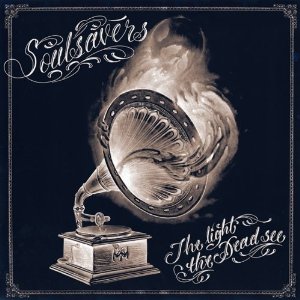
 “When you’re looking for salvation / Better take some time to get your story straight”, sings Depeche Mode’s Dave Gahan on the closing track of Soulsavers’ latest album. Titled The Light the Dead See, it’s an album that fits right in with the dark and gloomy aesthetic of Depeche Mode’s best work, but very much exists in its own soundspace. The instrumentation is primarily organic in nature, and the lyrics are Gahan’s, which actually puts it more in the realm of Gahan’s solo work, but Soulsavers’ creation is different than that as well. This is Gahan getting his story straight, really, finding a way to write about a mortality that he has too often confronted. This without the cool distance of Martin Gore’s songwriting stile, without the too-easy navelgazing of his solo work.
“When you’re looking for salvation / Better take some time to get your story straight”, sings Depeche Mode’s Dave Gahan on the closing track of Soulsavers’ latest album. Titled The Light the Dead See, it’s an album that fits right in with the dark and gloomy aesthetic of Depeche Mode’s best work, but very much exists in its own soundspace. The instrumentation is primarily organic in nature, and the lyrics are Gahan’s, which actually puts it more in the realm of Gahan’s solo work, but Soulsavers’ creation is different than that as well. This is Gahan getting his story straight, really, finding a way to write about a mortality that he has too often confronted. This without the cool distance of Martin Gore’s songwriting stile, without the too-easy navelgazing of his solo work.
The Light the Dead See finds David Gahan finally growing up, at least in a musical sense. It is an album in which he imparts on us, his listeners, the wisdom and humility that multiple brushes with death can force upon a man, without ever presuming to have all the answers. He sounds human; he sounds honest.
This is not to say that he has left his sense of drama behind. After a short instrumental opener from Soulsavers’ core of Rich Machin and Ian Glover that evokes the visual of Gahan, cowboy hat on, walking toward the camera from a heat-obscured desert horizon, the trio offers “In the Morning”, an aching, beautiful song that might not have sounded all that out of place on Songs of Faith and Devotion. “Why can’t you hear me? Why don’t you feel me?” It could be an ode to a lost love or a song from a ghost to the living, and it honestly doesn’t matter; either way, Gahan’s “Amazing Grace”-evoking question of “Do you think that I am lost or am I found” falls comfortably into the image of Gahan we are familiar with.
Much of the credit for this, of course, must be offered to Machin and Glover, who are taking a crack at working with a singer with a reputation for being slick and mechanical. Gahan is quite the stylistic shift from Mark Lanegan, whose weary and weathered voice was a natural match for the downcast blues and gospel-tinged music put together by the duo. It seems that it was clear that working with Gahan would be a little different, and the swooping strings and choirs in some of these tracks are proof of a duo up to the challenge.
What’s impressive is that Gahan raises his game right along with them, offering a screamed melody in the last third of “Gone Too Far” as electric fuzz and drum fills destroy the bucolic acoustics of the majority of the song. Backing vocals alternate between overdubbed “Gahan choirs” (the end of “Take Me Back Home”) and actual gospel-tinged females (lovely first single “Longest Day”), and thanks to Glover and Machin’s affinity for minor key arpeggiation and slide guitar, Gahan never really takes the cowboy hat off. He’s the weathered hero who never has to fire his gun, and it works for him.
Granted, it’s not a perfect album. There are songs whose contemplative nature renders them inert, a problem Gahan ran into on his debut solo album Paper Monsters as well. “Presence of God” is nearly monotone for much of its playing time, and no pipe organ or string section is going to be enough to make up for the lack of drums or melodic development. Penultimate track “Take”, despite some beautiful vocal work, sounds in a couple of places as if it’s really about to explode and get interesting, and then just…stops and starts over.
Still, as the first full-length album we’ve heard from Gahan since Depeche Mode’s all but atonal Sounds of the Universe, The Light the Dead See is a comfort. Gahan is singing, really singing, some beautiful melodies here, and even some of his less-inspired lyrical choices sound gravely important. Perhaps you, as a fan of Soulsavers, will miss the gravel of Lanegan’s voice; it’s true, Gahan represents a pretty serious stylistic shift. Still, if you’ve ever found any appeal in Gahan’s voice, there is depth and there is beauty to be found here.
Grade: A-

1 comment
New Release Report 5/22/12: John Mayer Finally Pulls His Foot From His Mouth | Popblerd!! says:
May 22, 2012
[…] They’re the leading lights in a fairly busy new release week. British DJ/remix team Soulsavers have drawn a lot of influence from eighties synth-rock outfits like Depeche Mode, and for their latest album, The Light The Dead See, they’ve enlisted DM frontman Dave Gahan to handle the majority of the lead vocals. Of course, if you’re a regular reader of this site, you may have already gotten a gander at our review. […]